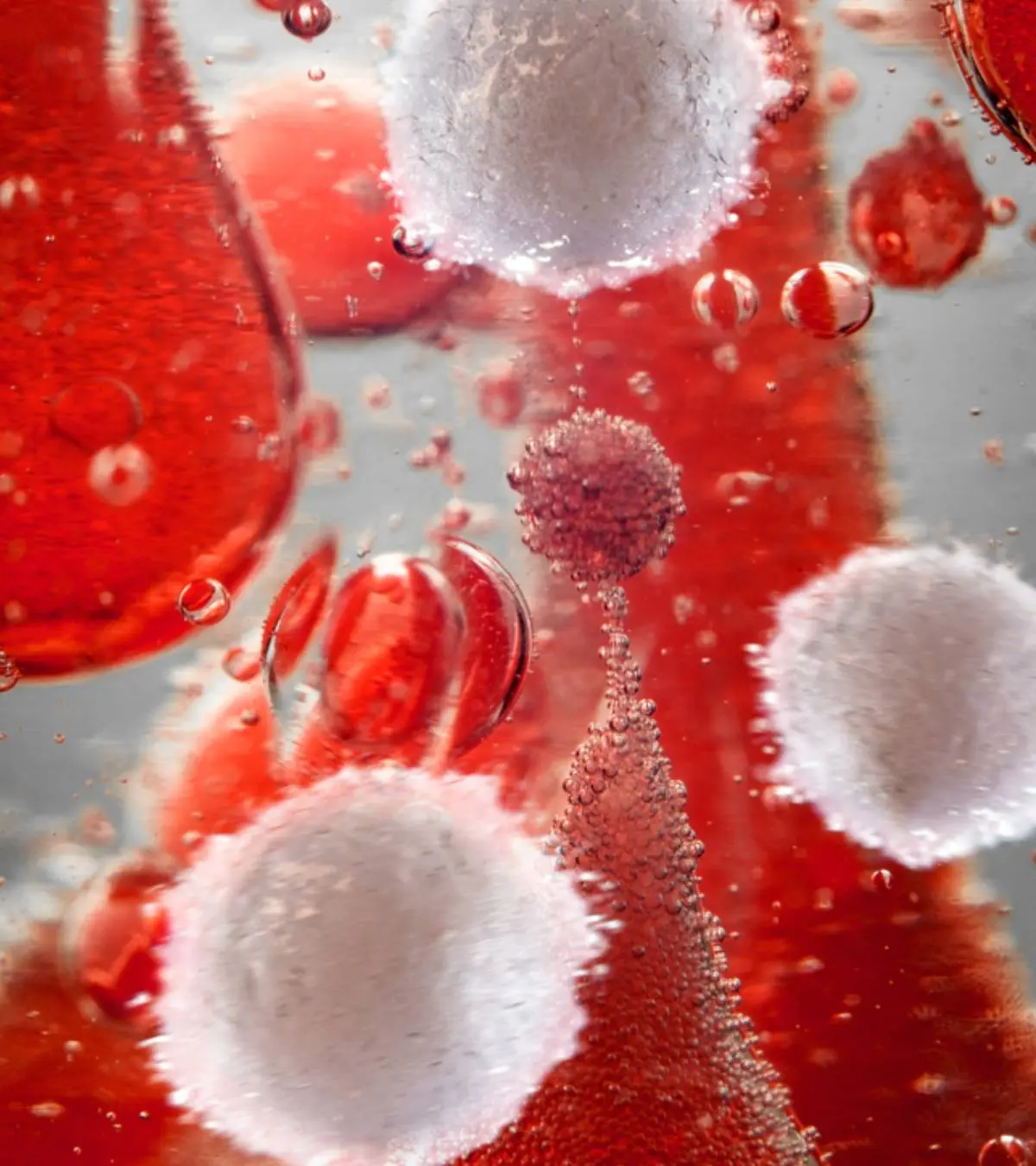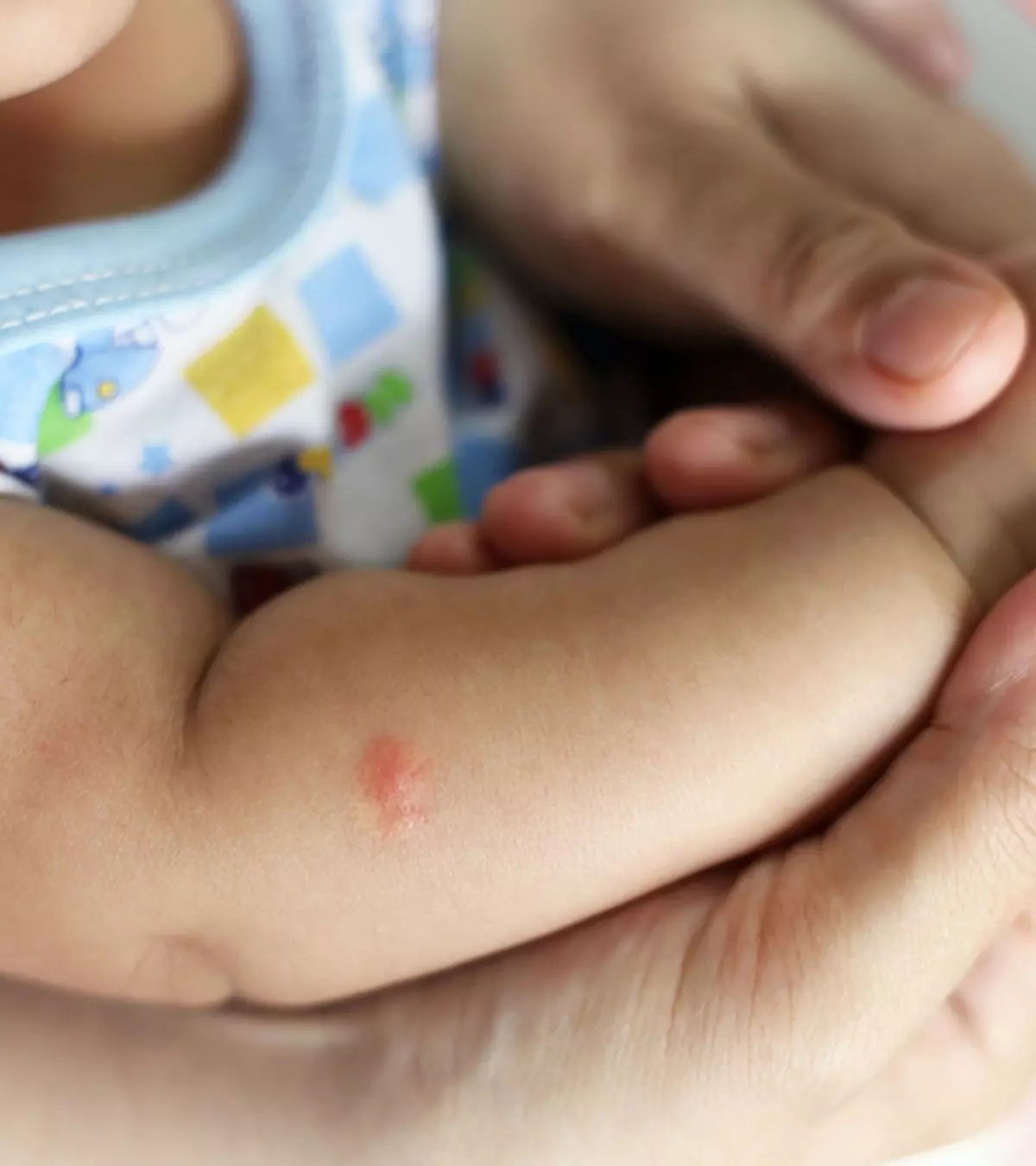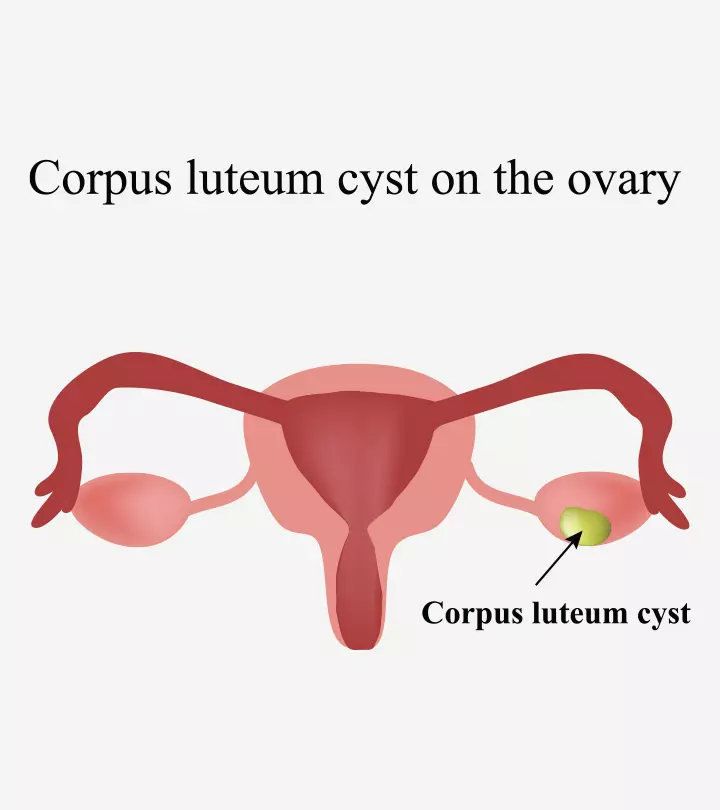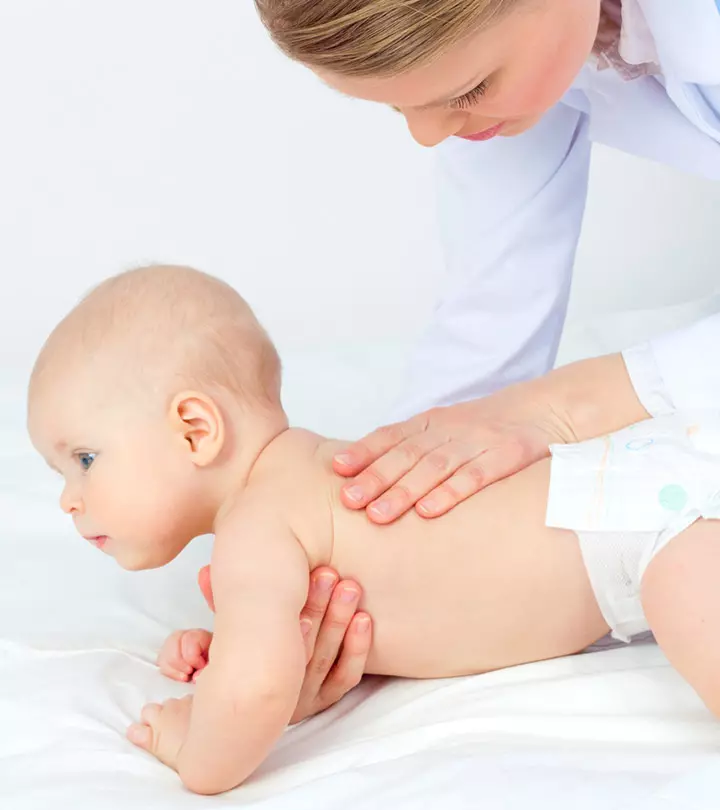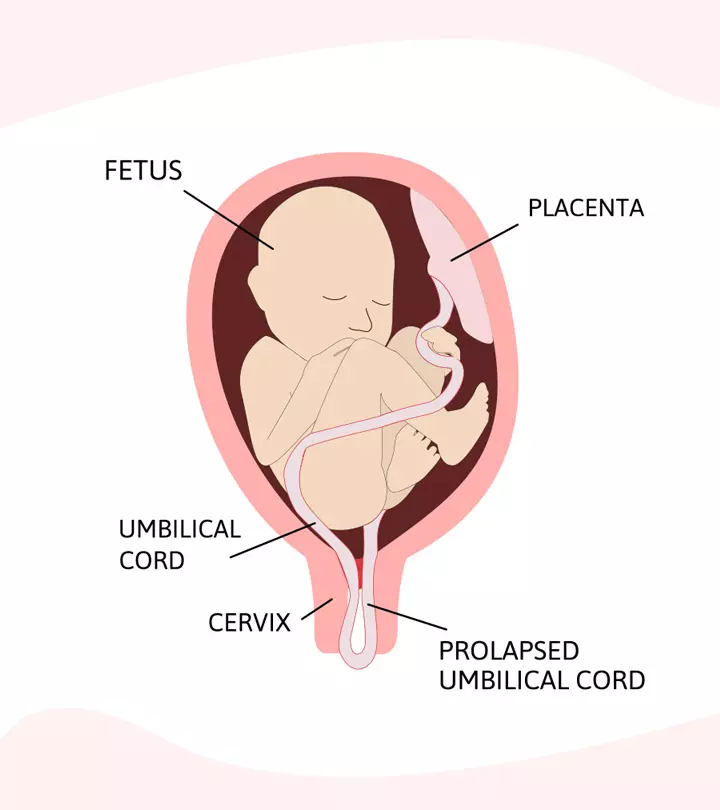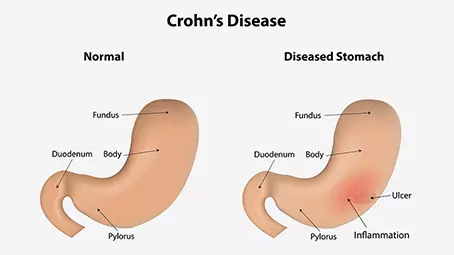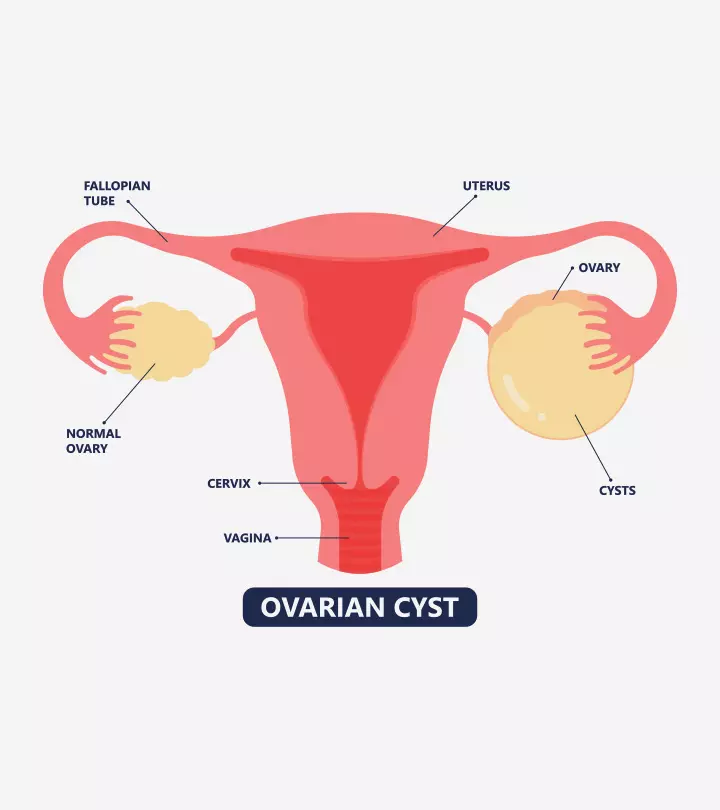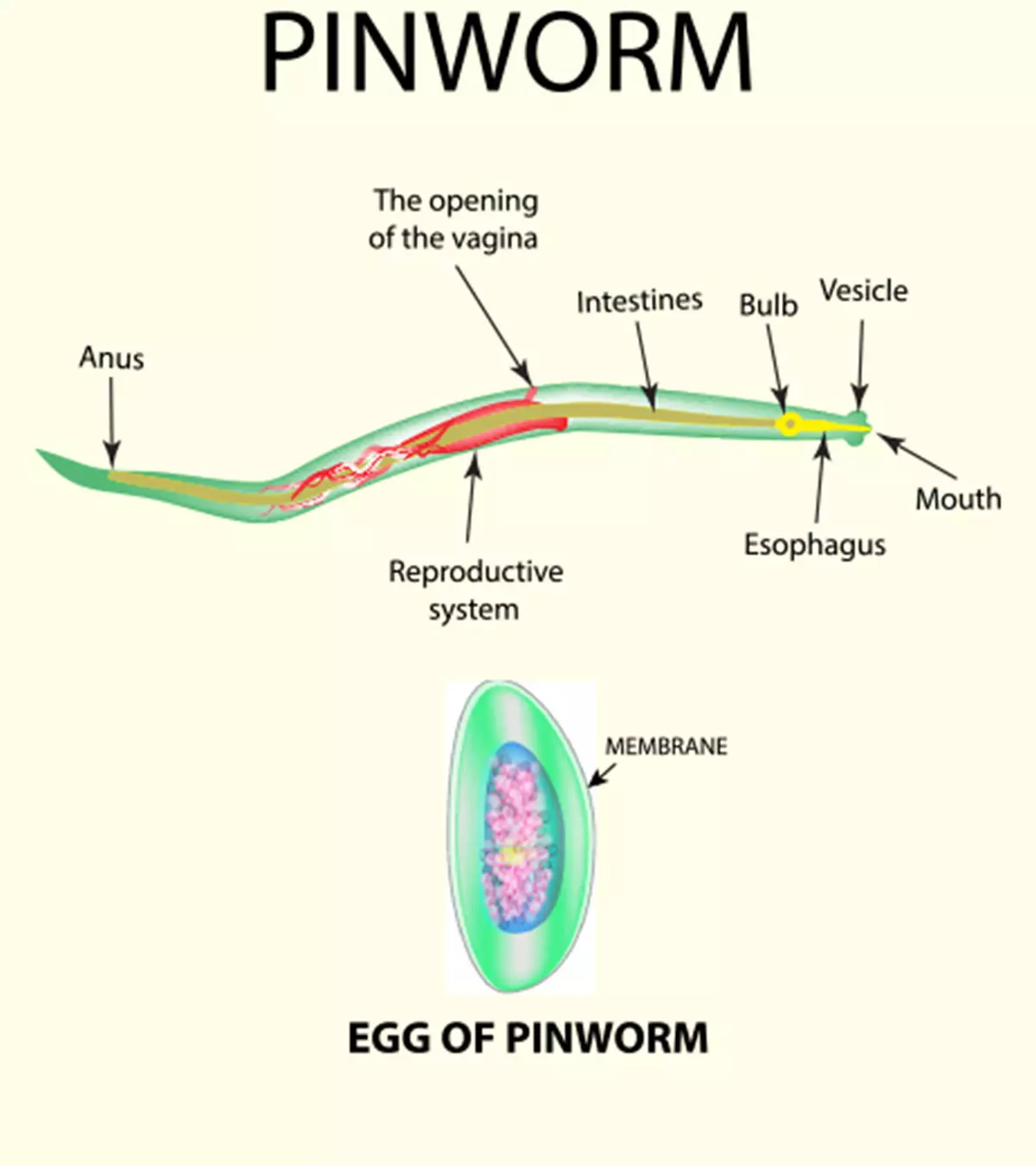
Image: ShutterStock
Pinworm infection in pregnancy may occur if a woman comes in contact with the pinworm eggs from infected people or contaminated objects or surfaces. This infection is also called oxyuriasis or enterobiasis, and it is one of the common worm infections in humans. Although pregnancy is not a risk factor for pinworm infestation, it can be challenging to take several anthelmintic tablets during pregnancy, especially during the first trimester (1).
Read on to know more about the causes, symptoms, diagnosis, treatments, and ways to prevent pinworm infections during pregnancy.
Key Pointers
- Pinworm infection during pregnancy can occur via contact with infected humans or contaminated surfaces.
- Symptoms of pinworm infection during pregnancy include anal and vaginal itching, abdominal pain or cramps, nausea, and weight loss.
- Severe pinworm infections during pregnancy may cause vaginitis, endometritis, salpingitis, UTI, or appendicitis.
- Doctors may suggest anthelmintics to the whole family as pinworm infections are contagious.
- Practicing safe hygiene practices such as washing hands after visiting the washroom and taking regular showers can reduce the risk of pinworm infections during pregnancy.
What Are Pinworms?
A pinworm is a tiny, white roundworm (nematode) that grows inside the gastrointestinal tract of humans during its entire lifecycle. It is a common intestinal parasite.
Pinworms are also known as seatworms, enterobius vermicularis, or threadworms. They cause helminthiasis (worm infection) in humans.
Intestinal parasites like pinworms grow in the bowel and infect the anal area. They are highly contagious parasites that may infect all family members if one is infected (2).
What Are The Causes Of Pinworm Infections During Pregnancy?
Lack of proper hygiene is the leading cause of pinworm infections in pregnant women. The following may make you more susceptible to parasitic infections (3):
- Not washing the hands properly before eating and after using the toilet
- Not washing the hands before cooking
- Not trimming and cleaning the fingernails
- Not cleaning the household items, bed sheets, towels, etc.
- Living in crowded living conditions
- Sharing clothes
How Are Pinworms Spread In Pregnancy?
Pinworms can be spread from one infected person to another by direct touch or through objects. Eggs of pinworms can spread to another person from surfaces the infected person has touched after scratching the affected area.
The transmission may occur from clothes and bedsheets also. Pinworms usually survive for two to three weeks.
In rare cases, pinworm infection can be caused by the inhalation of airborne pinworm eggs.
After reaching the intestines, these eggs start to hatch. A new worm can start laying eggs within two weeks. This may cause reinfection in a person if they do not follow good hygiene practices (4).
Signs And Symptoms Of Pinworm Infection During Pregnancy

Some may not develop any symptoms of infection. The usual symptoms and signs of pinworm infection in pregnant women can be (3):
- Anal discomfort, including itching, more intense in the night hours
- Vaginal and rectal itching
- Abdominal pain or cramps
- Weight loss
- Nausea
- Loss of appetite
- Sleep disturbances
Consult your doctor if you have any of these symptoms for proper diagnosis and the right treatment options, especially when you’re pregnant. Though it may not affect your baby, it may affect your well-being and make you immunocompromised.
Complications Of Pinworm Infection During Pregnancy
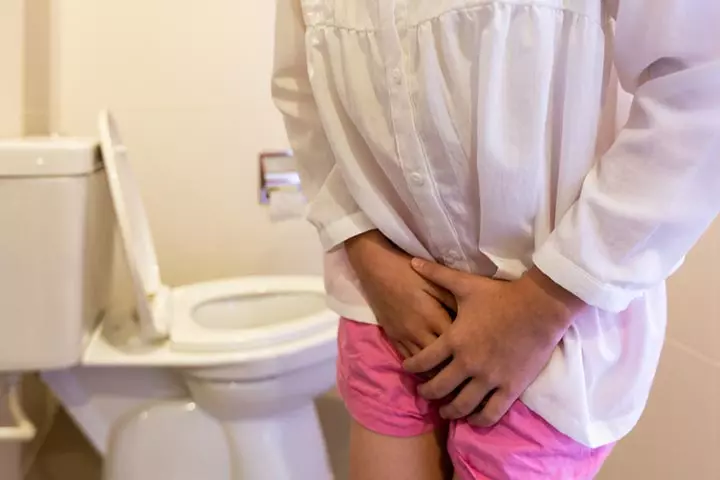
Generally, pinworm infections do not cause serious pregnancy complications. In rare cases, heavy infestations can cause infection of the female genitals. Heavy infestation of pinworm happens if you leave it untreated and do not follow good personal hygiene. It may also cause weight loss in some women.
In certain cases, it may result in the movement of the parasite from the anal area to the vagina or urethra and cause the following (5):
- Vaginitis (inflammation of the vagina)
- Endometritis (inflammation of the inner lining of the uterus)
- Salpingitis (inflammation of the fallopian tubes)
- Urinary tract infection
- Appendicitis in long-standing worm infestation
- Superficial bacterial infection due to the scratching of the anal area
- Possible impact on sleep quality
- Emotional stress because of the persistent discomfort
Diagnosis Of Pinworm Infection During Pregnancy
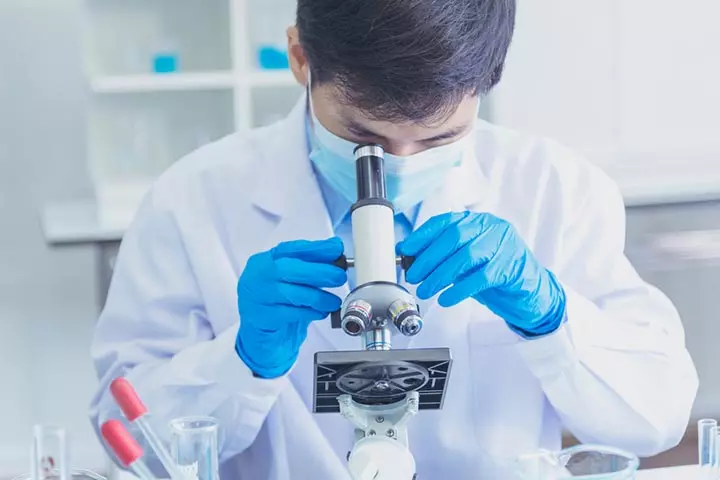
Pinworm infection can be diagnosed using (6):
- Tape test: It is a diagnostic test done using transparent adhesive tapes. Place adhesive tape around the anal area as soon as you wake up in the morning for three consecutive days. This makes the eggs stick to the tape. Your doctor can then confirm the presence of worms by observing the tape under a microscope.
- Moistened swab: A wet swab can be used to collect and identify pinworm eggs in the anal area.
- Fingernail samples: Sometimes, the worms can be diagnosed by analyzing the samples from under the fingernails using a microscope.
Pinworm Treatment During Pregnancy
The following anthelmintics are used to eliminate parasitic worms (7)(8):
- Mebendazole: The drug that kills the worms by blocking the uptake of nutrients and glucose from the intestine.
- Albendazole (Albenza): It reduces energy production in worms, thus causing death and immobilization of the parasite.
- Pyrantel pamoate (Pin-X, Reese’s pinworm medicine): It blocks the nerves in worms and leads to paralysis of the parasite, thus facilitating the removal of the worm in the stool.
Dosage:
Anthelmintic medications are given in a single dose initially, followed by another dose of the same drug after two weeks to avoid the possible risk of reinfection (7).
Your doctor may prescribe anthelmintic such as mebendazole or albendazole. Otherwise, they may recommend over-the-counter pyrantel pamoate to you and others in the family to prevent pinworm infection.
Note: It is recommended that you follow good hygiene practices to avoid reinfection. Even though the worms die with medications, their eggs may survive up to two to three weeks and cause reinfections.
Safety Of Deworming Drugs During Pregnancy
All the three drugs mentioned above belong to the category C drugs for pregnancy. Category C drugs are the drugs that have shown some adverse effects in animal experiments, but there are not enough studies about their effects on humans. Despite the risk factors, these drugs are usually recommended if there is a plausible benefit (9).
Deworming during pregnancy is usually recommended if the pinworm infection affects the well-being of a pregnant woman, often due to weight loss or sleep disturbances.
Mebendazole is not contraindicated during breastfeeding. And there are not enough studies on the safety of the other drugs during breastfeeding (9). Monitor your condition for side effects after the treatment initiation. Regular follow-ups are also helpful to ensure the treatment is working and there are no complications to the pregnancy.
 Quick fact
Quick factNote: It is recommended that you consult your doctor if you or a family member has pinworm infection when you are pregnant. Do not take over-the-counter deworming medications before consulting your doctor. Your doctor will recommend the appropriate treatment or hygiene measures based on the requirement.
How To Prevent Pinworm Infection When Pregnant

The following hygiene practices may help maintain the necessary maternal health by preventing pinworm infection and reinfection during pregnancy (10):
- Wash your hands with soap after using the washroom and before meals.
- Avoid putting your fingers in the mouth.
- Take regular showers.
- Wash the anal area in the morning to reduce the eggs.
- Change your underwear daily.
- Change your bed covers daily.
- Wash your clothes in warm water with detergent and dry them on high heat.
- Keep your fingernails trimmed.
- Avoid scratching the anal area.
- Do not share towels and clothes.
- Keep your house clean.
- Educate your family about the importance of hygiene practices to prevent the spread of infection.
 Quick tip
Quick tipAlthough some anecdotal home remedies for pinworm infections, such as the application of coconut oil, tea tree oil, apple cider vinegar, or crushed garlic, may be practiced by some people, there is no scientific evidence that they could reduce worm infestation and reinfection.
Home treatments, such as the consumption of carrots and probiotics to improve digestive health, may have certain positive effects. However, there are not enough studies to say that these could be used as alternatives to anthelmintic treatments.
Frequently Asked Questions
1. What happens if pinworms enter my vagina?
Pinworms can reach the vagina from the anus and cause vaginal inflammation, known as vaginitis. It can cause pain, discharge, and vaginal itching during pregnancy. If left unmanaged, it may lead to urinary tract infections (11).
2. Can pinworms enter my uterus?
Pinworms rarely move from the vagina to the uterus or fallopian tubes and reach other pelvic organs. If it does, it may cause inflammation of the uterine lining (endometritis) and infection of the peritoneal cavity (12).
3. Can worms harm the baby during pregnancy?
Pinworm infection during pregnancy may not harm the unborn baby. However, you may require a prescription to take medications. Although some medications are unsafe, doctors may adjust the dose based on the gestational week and prescribe the safest options to protect the baby and mother (13).
4. Can pinworms go away on their own?
Pinworms rarely go away on their own and cause a high risk of reinfection. However, extreme hygiene measures can help control the condition. If no improvement is observed, you may need medications to treat worm infections (13) (14).
5. How do I stop worms from itching at night?
Washing the anal area with soap and warm water and applying hydrocortisone creams around the anus may help relieve itching. Avoid scratching the anal area since the wounds can become infected (11).
6. Do pinworms show up in ultrasound?
Pinworms are usually not visible on an ultrasound because they are too small and do not produce recognizable images. However, a case study showed that ultrasonography or ultrasound can help detect pinworm infestation affecting appendix (15).
7. Can pinworms be detected in a blood test?
Examining stool samples is ineffective for diagnosing pinworm infections as the eggs and worms are typically in low numbers. Additionally, there are no serologic tests available for detecting pinworm infections (16).
8. How long does itching from pinworms last?
Itching from pinworms lasts as long as the infection is present. However, once the treatment begins, the itching may resolve within five to seven days (17).
Pinworm infections during pregnancy develop if proper hygiene is not maintained or if you come in contact with an infected person. Although it typically doesn’t have severe effects on pregnant women, a heavy infestation of the parasite, if left untreated, could lead to complications such as endometritis, vaginitis, or UTI during pregnancy. Therefore, it is advised to maintain proper hygiene levels, wash hands regularly, and keep your surroundings clean to prevent the infection of such parasites. In addition, follow the advised medication routine and contact the doctor immediately if you feel any discomfort to avoid serious complications.
Infographic: Facts About Pinworms In Pregnancy
Pinworms in pregnancy can affect the mother’s quality of life by causing anal itching and sleeping problems. You may practice good hygiene and take medications to eliminate worms from the intestines. Go through the infographic to learn more about pinworms in pregnancy.
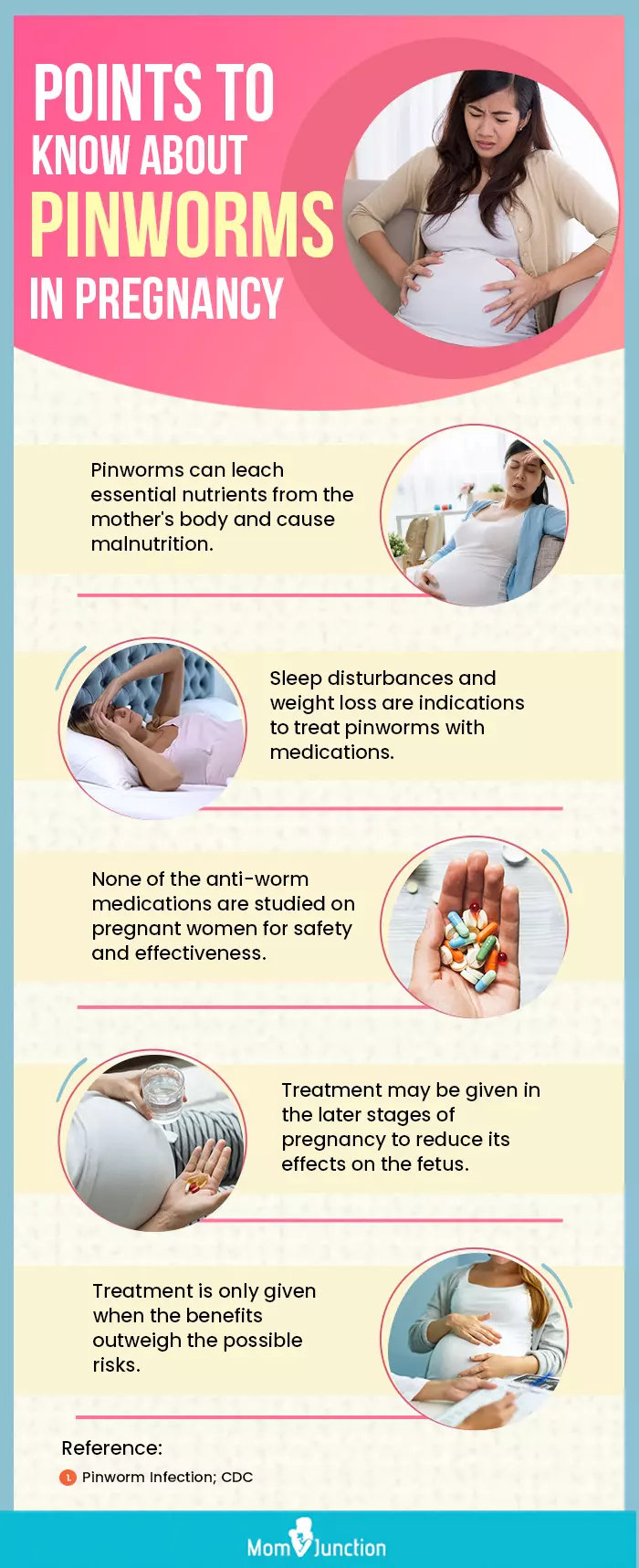
Illustration: Momjunction Design Team
Illustration: Pinworms In Pregnancy: Causes Diagnosis And Treatment

Image: Stable Diffusion/MomJunction Design Team
References
1. About Pinworm Infection; Centers for Disease Control and Prevention
2. Pinworm Infection; Mayo Clinic
3. Pinworm infection; New York State Department of Health
4. Joan Hamblin, et. al.; (1995); Pinworms In Pregnancy
5. Prashanth Rawla and Sandeep Sharma; Enterobius Vermicularis (Pinworm); The United States National Library of Medicine
6. Diagnosing Pinworms; Centers for Disease Control and Prevention
7. Clinical Overview of Pinworm infection; Centers for Disease Control and Prevention
8. Ann E. Lloyd, et al.; Treatment Options and Considerations for Intestinal Helminthic Infections; The United States National Library of Medicine
9. Deworming in pregnant women; World Health Organization
10. Pinworm (threadworm) infection; health; Victoria State Government
11. Pinworms; Cleveland Clinic
12. Pinworm Infection. St. Clair Health
13. Treatment of threadworms during pregnancy; Bumps
14. That Anal Itch: How to Diagnose and Permanently Get Rid of Pinworms; St Louis Children’s Hospital
15. Ahmet Ali Tuncer et al.;A Clinical Case of Acute Abdomen Caused by a Pinworm in Appendix: Ultrasound Images – A Case Report; Bentham Science Publishers
16. Sebastian Wendt, et. al.; (2019); The Diagnosis and Treatment of Pinworm Infection
17. Pinworms; Kidshealth
Community Experiences
Join the conversation and become a part of our nurturing community! Share your stories, experiences, and insights to connect with fellow parents.
Read full bio of Dr. Shashwat Jani
Read full bio of Dr Bisny T. Joseph
Read full bio of Rebecca Malachi
Read full bio of Dr. Joyani Das











